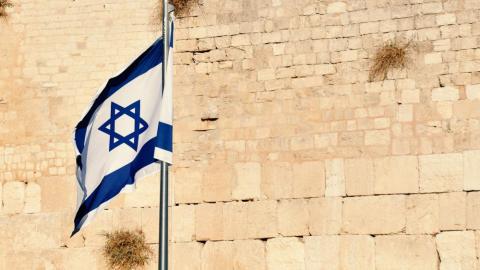As Memorial, Independence Days End, Israel's Attention Turns to Rafah, Hezbollah Battlefronts
JERUSALEM, Israel – With the commemoration of Israel's Memorial Day and Independence Day now complete, the nation's attention is returning to the seven-month war with Hamas and new provocations from Hezbollah in Lebanon.
Prime Minister Benjamin Netanyahu met with wounded soldiers, as Israel's Independence Day celebration was more muted this year during wartime.
Netanyahu said he was impressed by the message he heard from the soldiers: "Continue until the end – until a decisive victory over Hamas."
The prime minister also called October 7th a watershed moment in Israel's history.
“On Simchat Torah, we endured an event on a Biblical scale," he stated. "Our enemies attacked us, exactly on the day when the people of Israel celebrate the continuity of study from Genesis and back again.”
Last week, President Joe Biden announced the U.S. had withheld a shipment of bombs from Israel to protest Israeli plans to invade Rafah.
This week, though, he's going ahead with an arms package for Israel of more than $1.2 billion. It includes tank ammunition and mortar rounds.
In the meantime, Israel's operation in Rafah to eliminate the last Hamas battalions is ongoing; and seems to be making slow, but steady progress, as hundreds of thousands of Gazans flee the war zone.
Israel has long accused the United Nations Relief and Works Agency (UNRWA) of collaborating with Hamas. Now, the military is releasing a video of Hamas terrorists operating next to U.N. vehicles at an UNRWA facility in Rafah.
Israel Defense Forces Spokesman Rear Adm. Daniel Hagari announced, “Today we revealed unusual documentation of armed terrorists next to U.N. vehicles that we located a few days ago, carrying out shootings inside the compound of UNRWA of the U.N. in East Rafah."
Israeli Foreign Minister Israel Katz posted on X that the U.N. can no longer hide the truth that "UNRWA is an arm of the terrorist organization Hamas."

At a ceremony marking Israel's Independence Day, President Isaac Herzog emphasized that recovering the hostages in Gaza is a top priority for the Jewish people.
“These days we are full of the pain of bereavement, pain for the wounded, the pain for civilians uprooted from their homes, the pain for the hostages. I reiterate, that there is no greater Mitzvah (commandment) than redeeming the captives," Herzog declared.
Yet, the fate of the 132 hostages still in Hamas' hands seems precarious. Mediators in Qatar indicate that the negotiations to reach a ceasefire and free the hostages appear to be at a standstill.
Hamas fired rockets into southern Israel Wednesday. A day earlier, thousands of Israelis marched in Sderot, calling for Israel to control Gaza after the war.
Protester Rachel Idan explained, "We want to tell everybody in Israel and everybody in the world that Gaza is very, very important to us and it has to be again in Israeli hands – because if it won't be in Israeli hands, we won't finish the things that we started doing in this war."
In the north, the Iranian-backed Hezbollah fired more than 80 rockets into Israel at midday Wednesday, in an apparent retaliation for the killing of a top Hezbollah commander on Tuesday. The rocket attack centered on an Israeli air base, and anti-tank rockets were fired at the city of Kiryat Shmona.
***Please sign up for CBN Newsletters and download the CBN News app to ensure you keep receiving the latest news.***




